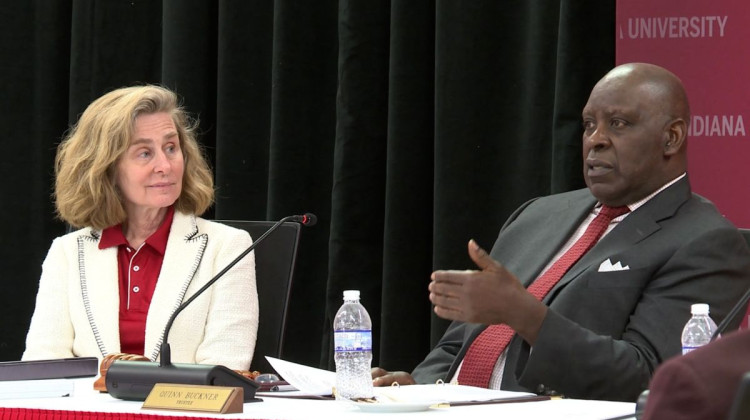
Members of the Purdue community listen to comments about whether the school should make passing a civics test a graduation requirement.
Stan Jastrzebski / WBAA NewsA Friday discussion about the possibility Purdue University might mandate passage of a civics exam to graduate came to few conclusions, except that the existing national citizenship test seems ill-suited for the job President Mitch Daniels wants done.
“They can cram for the test, they can know those facts – they can know 1787, they can know 27, and then they can forget it the next day when they’ve passed it.." says English professor Tara Johnson. "So what is the long-term benefit of teaching to a test, essentially?”
Several speakers noted problems with the test currently given when naturalizing immigrants to become American citizens, pointing out it’s time-intensive and has questions whose difficulty level vary wildly. And, says social studies professor Anatoli (ann-uh-TOLE-ee) Rapoport – who took it himself to become a citizen – it’s not designed to show that students have a grasp of civics literacy necessary to be contributing members of society, which seems to be Daniels’ chief concern.
“It’s not created specifically to measure what we’re trying to measure here," Rapoport says. "So we should be very careful with the test.”
Daniels, and Indiana Senate Education Committee Chair Dennis Kruse (R-Auburn), have been outspoken about their feeling students don’t know enough about government or U.S. history.
But speakers at the town hall worried college seniors would only learn enough to pass a test and not actually gain any lifelong knowledge.
Political science professor Jay McCann even submitted there might not be the type of problem Daniels suggests, and that trying to measure such a thing at the end of four years of college might not be as useful as surveying grads a few years after they’re out of school.
“Do we want to capture that, you know, two weeks before graduation and come to some sort of conclusion about it’s there or it’s not there,” he asked.
Current Purdue Student Government Vice President Olivia Keller suggested the test might be better administered to high schoolers, rather than collegians whose major might not include many civics, government or history classes.
“College, for us, is supposed to be somewhere you go and you explore things that you like to do," Keller says. "Whereas high school – or even K-12 -- is somewhere where it’s required.”
The Purdue Senate will take the feedback, as well as results of an online exam currently being offered to Purdue community members, and present a recommendation later this year.
 DONATE
DONATE









 Support WFYI. We can't do it without you.
Support WFYI. We can't do it without you.